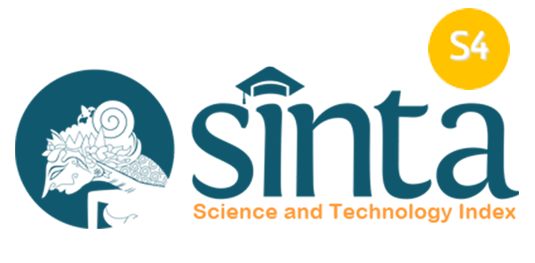The Roles of Emerging Technology in Chemistry Teaching and Learning for a Sustainable Development
Abstract
Keywords
Full Text:
PDFReferences
Acosta-Castellanos, P.M., and Queiruga-Dios, A. (2022). From environmental education to education for sustainable development in higher education: A systematic review. International Journal of Sustainability in Higher Education, 23(3), 622-644.
Akpomi, M.E., Dambo, B.I., Ikpesu, O.C., Singer, S.A., Wokocha, K.D., Ben-George, I., and Babalola, J.O. (2020). Educational, scientific and technological innovations for sustainable development in Nigeria. World Journal of Entrepreneurial Development Studies, 5(1), 50-63.
Appio, F.P., Frattini, F., Petruzzelli, A.M., and Neirotti, P. (2021). Digital transformation and innovation management: A synthesis of existing research and an agenda for future studies. Journal of Product Innovation Management, 38(1), 4-20.
Babadi, A.A., Rahmati, S., Fakhlaei, R., Barati, B., Wang, S., Doherty, W., and Ostrikov, K.K. (2022). Emerging technologies for biodiesel production: Processes, challenges, and opportunities. Biomass and Bioenergy, 163, 106521.
Bizami, N.A., Tasir, Z., and Kew, S.N. (2023). Innovative pedagogical principles and technological tools capabilities for immersive blended learning: A systematic literature review. Education and Information Technologies, 28(2), 1373-1425.
Chiu, W.K. (2021). Pedagogy of emerging technologies in chemical education during the era of digitalization and artificial intelligence: A systematic review. Education Sciences, 11(11), 709.
Ciarli, T., Kenney, M., Massini, S., and Piscitello, L. (2021). Digital technologies, innovation, and skills: Emerging trajectories and challenges. Research Policy, 50(7), 104289.
Erwin, D.H. (2021). A conceptual framework of evolutionary novelty and innovation. Biological Reviews, 96(1), 1-15.
Fabris, M., Abbriano, R.M., Pernice, M., Sutherland, D.L., Commault, A.S., Hall, C.C., Labeeuw, L., McCauley, J.I., Kuzhiuparambil, U., Ray, P., Kahlke, T., and Ralph, P.J. (2020). Emerging technologies in algal biotechnology: Toward the establishment of a sustainable, algae-based bioeconomy. Frontiers in Plant Science, 11, 279.
Fan, X., Jiang, X., and Deng, N. (2022). Immersive technology: A meta-analysis of augmented/virtual reality applications and their impact on tourism experience. Tourism Management, 91, 104534.
Fombona-Pascual, A., Fombona, J., and Vázquez-Cano, E. (2022). VR in chemistry, a review of scientific research on advanced atomic/molecular visualization. Chemistry Education Research and Practice, 23(2), 300-312.
Goel, R.K., and Vishnoi, S. (2022). Urbanization and sustainable development for inclusiveness using ICTs. Telecommunications Policy, 46(6), 102311.
Grace, T.J., Abiodun, G.M., Sahdat, A.S., Rebecca, O., and Ebunoluwa, R.O. (2024). Harnessing science education for future transformation in Nigeria. Educational Perspectives, 12(1), 255-267.
Haleem, A., Javaid, M., Qadri, M.A., and Suman, R. (2022). Understanding the role of digital technologies in education: A review. Sustainable Operations and Computers, 3, 275-285.
Jain, D. (2020). Renewable energy: Powering a safer future. International Journal of Multidisciplinary Research in Science, Engineering and Technology, 1(3), 429-434.
Javaid, M., Haleem, A., Singh, R.P., Suman, R., and Khan, S. (2022). A review of blockchain technology applications for financial services. Bench Council Transactions on Benchmarks, Standards, and Evaluations, 2(3), 100073.
Kokkinos, L. (2024). Revolutionizing education: The dynamic intersection of technology and learning. International Journal of Multidisciplinary and Current Educational Research, 6(1), 26-32.
Korteling, J.H., van de Boer-Visschedijk, G.C., Blankendaal, R.A., Boonekamp, R.C., and Eikelboom, A.R. (2021). Human-versus artificial intelligence. Frontiers in Artificial Intelligence, 4, 622364.
Nizetic, S., Solic, P., Gonzalez-De, D.L.D.I., and Patrono, L. (2020). Internet of Things (IoT): Opportunities, issues and challenges towards a smart and sustainable future. Journal of Cleaner Production, 274, 122877.
Nofer, M., Bauer, K., Hinz, O., van der Aalst, W., and Weinhardt, C. (2023). Quantum computing. Business & Information Systems Engineering, 65(4), 361-367.
Onyema, E.M. (2020). Integration of emerging technologies in teaching and learning process in Nigeria: The challenges. Central Asian Journal of Mathematical Theory and Computer Sciences, 1(11), 35-39.
Oriji, A., and Nnadieze, G.C. (2023). Teachers' current technological challenges and expectations for futuristic learning in a knowledge-based economy. Global Academic Journal of Humanities and Social Sciences, 5(2), 96-111.
Rani, S., Mishra, R.K., Usman, M., Kataria, A., Kumar, P., Bhambri, P., and Mishra, A.K. (2021). Amalgamation of advanced technologies for sustainable development of smart city environment: A review. IEEE Access, 9, 150060-150087.
Rehan, H. (2023). Internet of Things (IoT) in smart cities: Enhancing urban living through technology. Journal of Engineering and Technology, 5(1), 1-16.
Sahu, M.K., Yadav, R., and Tiwari, S.P. (2023). Recent advances in nanotechnology. International Journal of Nanomaterials, Nanotechnology and Nanomedicine, 9(1), 15-23.
Shafique, K., Khawaja, B.A., Sabir, F., Qazi, S., and Mustaqim, M. (2020). Internet of things (IoT) for next-generation smart systems: A review of current challenges, future trends and prospects for emerging 5G-IoT scenarios. IEEE Access, 8, 23022-23040.
Suklabaidya, S. (2024). Towards inclusive societies: Leveraging IoT for community development and education. Novel Insights, 1(1), 40-51.
Tapalova, O., and Zhiyenbayeva, N. (2022). Artificial intelligence in education: AIEd for personalized learning pathways. Electronic Journal of E-Learning, 20(5), 639-653.
Tsaramirsis, G., Kantaros, A., Al-Darraji, I., Piromalis, D., Apostolopoulos, C., Pavlopoulou, A., Alrammal, M., Ismail, Z., Buhari, S.M., Stojmenovic, M., Tamimi, H., Randhawa, P., Patel, A., and Khan, F.Q. (2022). A modern approach towards an industry 4.0 model: From driving technologies to management. Journal of Sensors, 2022(1), 5023011.
Wong, Y.K. (2022). Understanding the fundamentals of quantum computing. International Journal of Computer Science Trends and Technology, 10(2), 7-12.
Zamani, M., Yalcin, H., Naeini, A.B., Zeba, G., and Daim, T.U. (2022). Developing metrics for emerging technologies: Identification and assessment. Technological Forecasting and Social Change, 176, 121456.
DOI: https://doi.org/10.17509/ijotis.v4i2.75554
Refbacks
- There are currently no refbacks.
Copyright (c) 2024 Universitas Pendidikan Indonesia

This work is licensed under a Creative Commons Attribution-ShareAlike 4.0 International License.
Indonesian Journal of Teaching in Science (IJoTIS) is published by Universitas Pendidikan Indonesia (UPI)
 Indonesian Journal of Teaching in Science
Indonesian Journal of Teaching in Science



